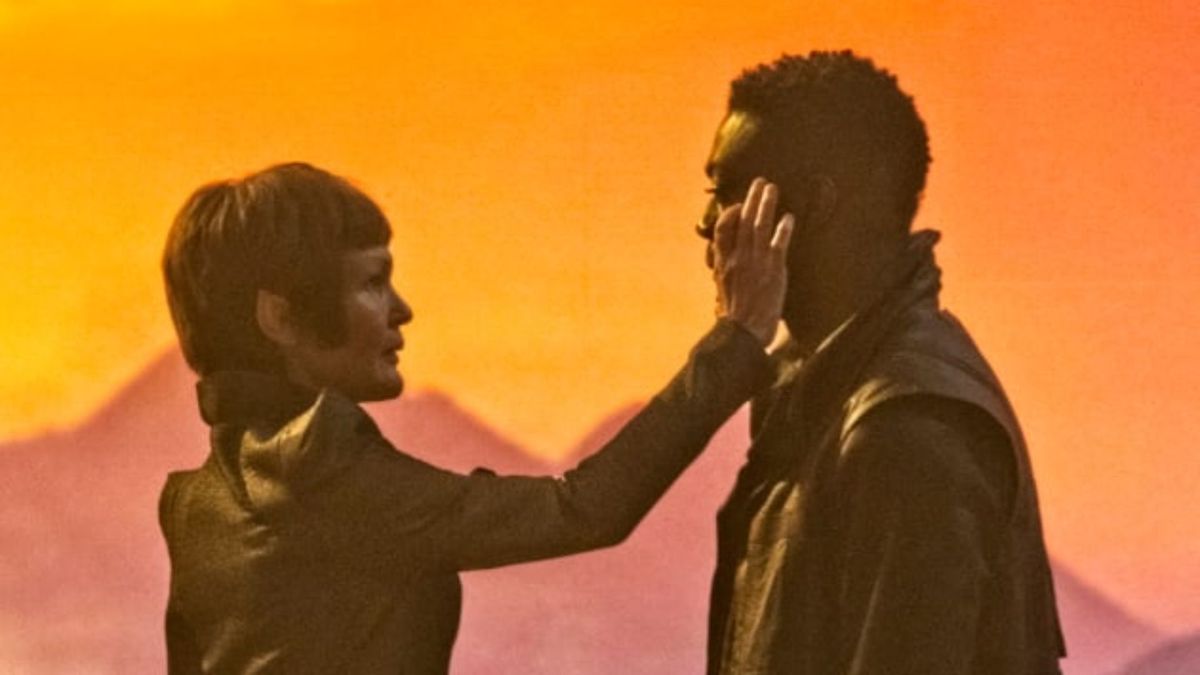12DOVE Verdict
An overly emotional outing that effectively puts the season’s arc on pause. With all three of the main plotlines feeling undercooked, it’s damning that the absence of an inanimate entity can make an episode feel so lifeless.
Why you can trust 12DOVE
Warning: This Star Trek: Discovery season 4, episode 3 review contains major spoilers – many of them set to stun. Boldly go further at your own risk…
The Federation faces an unprecedented threat from an Anomaly of unknown origin; the USS Discovery has barely escaped in one piece from its high-risk research mission to collect essential data on an unpredictable object with the power to destroy worlds; Starfleet is in a perpetual state of redder-than-red alert, so what do Michael Burnham and her crew do next? ‘Give themselves a breather by exploring other projects,’ is not what we expected…
In real life, taking some time out to pause and reflect is often a good idea, but three episodes into the arc of a new TV season – a time when viewers are traditionally still finding their feet – it feels like someone’s put Discovery into a dead-stop. Indeed, if it wasn’t for Stamets’ trip to Ni’Var for some intense science chat with the Vulcans and Romulans, you’d think someone at Paramount Plus had done a Firefly and broadcast the episodes in the wrong order.
In an episode struggling to find its A-plot, the prime contender is Burnham’s mission to catch a thief. A rogue offshoot of the Qowat Milat – the all-female, sword-wielding Romulan sect who debuted in Star Trek: Picard, preaching a doctrine of ‘absolute candor’ – is stealing dilithium from Federation starships. When one such heist results in the death of a Starfleet officer, the Federation has no choice but to get involved, dispatching Burnham to investigate alongside the high-ranking Qowat Milat who’d visited Discovery in season 3 and just happens to be… Burnham’s mum.
Adding to the trickiness of the situation is the ever-pragmatic Federation president’s desire to bring Ni’Var back into the Federation fold – where a case like this would traditionally come under Starfleet’s legal jurisdiction, diplomatic considerations mean allowing the Qowat Milat to do things their way.

For Tilly, hitching a ride with the Burnhams is a more exciting way of stepping out of her comfort zone than changing her route to the bridge, moving her pillow to the other end of the bed, or eating a cheese meal. Putting a science specialist in a position where she’s almost guaranteed to go into sword-to-sword combat seems like a questionable command decision, but the increasingly smug Saru thinks it’ll be good for her. Also, the mission is somewhat dependent on Tilly to supply some one-liners, as she’s pretty much the only source of humor in the episode
What they discover resembles a recycled plotline from an episode of The Next Generation replayed on fast-forward, an intriguing idea given neither the space nor the momentum to function properly. It turns out the reason Qowat Milat J’Vini – a woman whom Burnham Sr. owes her life – went on her lethal robbery spree was the discovery of an ancient, previously unknown alien race trapped in long-term stasis in a vast chamber strangely reminiscent of the Engineers’ ship in Alien. She needs the starship fuel to help them belatedly reach their intended destination.
The resolution relies on Star Trek diplomacy, the kind where both sides are so implausibly reasonable – even after the brutal death of their colleagues – that the drama evaporates out of a nearby airlock. Captain Burnham decides that J’Vini has a point, J’Vini agrees to let them help her in a mission and subsequently hand her in, and – bizarrely – the most Burnham gets worked up in the entire episode is when the Federation agree to hand the accused over to Ni’Var’s justice. Star Trek has been giving us a rose-tinted view of human behavior for decades, but sometimes writers need to put believable character dynamics ahead of utopian ideals. This could also have saved us from Admiral Vance’s trite analogy about Starfleet being like an orchestra.
Back on Discovery, the priority is getting Gray safely installed in his new android body. It’s an extremely contrived procedure that involves a holographic Trill removing Gray’s essence from Adira’s mind, leaving it in a kind of limbo until the inevitable compatibility issues can be resolved. It’s a predictably drawn out wait for Gray to wake up, but you never once feel like he’s going to be lost – instead, it’s an excuse to see Adira getting emotional at his bedside (and, randomly, playing darts). Indeed, in the rush to give Gray a corporeal form, the writers have passed up the opportunity to explore all sorts of interesting ideas about a soul being lost in a computer. In the 32nd century, the tech used by the Discovery seems to work every single time, and it’s getting predictable and dull.
Despite the other, less pressing distractions, ‘Choose to Live’ doesn’t forget about the Anomaly entirely. With Stamets frustrated that the killer mass ticks off all the boxes for a primordial wormhole but one – where are those elusive tachyons? – he enlists the help of the Ni’Var science institute, who apply a uniquely meditative approach to their research.
Luckily, Vulcans can call on the mind-meld to aid them in their quest for knowledge, which brings the rather fortunate side-effect of restoring Book’s memories of his late nephew, seemingly starting him on the road to recovery. Unfortunately, it also reveals the complete absence of the tachyons that would confirm the Anomaly’s wormhole status. Looks like the battle against this season’s Big Bad is back to square one…
New episodes of Star Trek: Discovery season 4 beam onto Paramount Plus on Thursdays in the US and Crave in Canada. UK viewers can watch episodes on Pluto TV.
More info
| Genre | Sci-fi |
Richard is a freelancer journalist and editor, and was once a physicist. Rich is the former editor of SFX Magazine, but has since gone freelance, writing for websites and publications including 12DOVE, SFX, Total Film, and more. He also co-hosts the podcast, Robby the Robot's Waiting, which is focused on sci-fi and fantasy.
Most Popular








